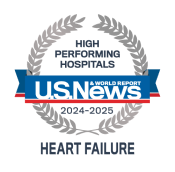Heart Failure Treatment
Depending on the severity of your condition, heart failure treatment will vary from person to person.
After diagnosis, the University of Maryland Heart and Vascular Center specialists will create an individualized care plan for you. Our heart failure team takes the time to get to know you so we can plan a course of treatment that meets your specific needs and situation.
You have the full spectrum of nonsurgical and surgical treatment options. You’ll receive advanced heart failure care at a high-performing hospital recognized by U.S. News & World Report.
To learn more about our program or to make an appointment, call 410-328-7877.
Nonsurgical Heart Failure Treatment
Nonsurgical heart failure treatments help you maintain quality of life without surgery. These include:
- Lifestyle modifications – A balanced, low-sodium diet; regular exercise; maintaining a healthy weight and quitting smoking can keep heart failure from getting worse. Our registered dietitians can help you make healthy diet changes.
- Medications – These can lower blood pressure, reduce fluid retention, improve circulation, slow your heart rate and prevent an irregular heartbeat.
- Infusion Clinic – An alternative to hospitalization, the infusion clinic removes fluid buildup in the legs, stomach or lungs. To make an appointment, call 410-328-8669.
Surgical Heart Failure Treatment
Surgical heart failure treatments for those with advanced heart failure can save lives. We offer:
- Remote Heart Pressure Monitoring – Remote sensor measures pressure in a patient’s pulmonary artery to help prevent worsening of heart failure.
- Pacemakers and Defibrillators – Implantable, battery-operated devices control heart rhythm disorders when medications or other therapies are not effective.
- Coronary Artery Bypass Grafting (CABG) – Surgery to redirect blood flow to your heart when your coronary arteries are blocked.
- Mitral Valve Repair – Surgery can improve function of the mitral valve which regulates blood flow between the heart’s left upper and lower chambers.
- Ventricular Assist Devices (VAD) – This life-saving device takes over the heart’s pumping function, allowing patients to live long enough to receive a new heart.
- Heart Transplant – If you have end-stage heart failure and severe symptoms that don’t respond to other treatment, you may benefit from a heart transplant.
Innovative Heart Failure Research and Treatments
In addition to advanced nonsurgical and surgical treatment for heart failure, we offer innovative, advanced treatments and support that are developed through clinical research. These include:
- Telemonitoring – A Medicare grant is helping our heart specialists evaluate whether monitoring heart failure patients at home can prevent hospitalization and improve quality of life. Patients receive scales and blood pressure cuffs, and upload results online to our researchers.
- Sleep Monitoring – Many heart failure patients also experience sleep disorders. Our physicians monitor and evaluate patients in the University of Maryland Sleep Center, and recommend appropriate treatment.
- Genomics – Our researchers study how migrating adult stem cells can target damaged areas and take over the function of the damaged muscle.
- ACORN CorCap – University of Maryland physicians are evaluating the ACORN CorCap, a mesh bag placed over an enlarged heart. The mesh prevents the heart from enlarging, improves heart function and may help the heart resume normal function, with the goal of eliminating the need for transplant.
Make an Appointment
Make an appointment with one of our heart failure specialists. Call 410-328-7877.

